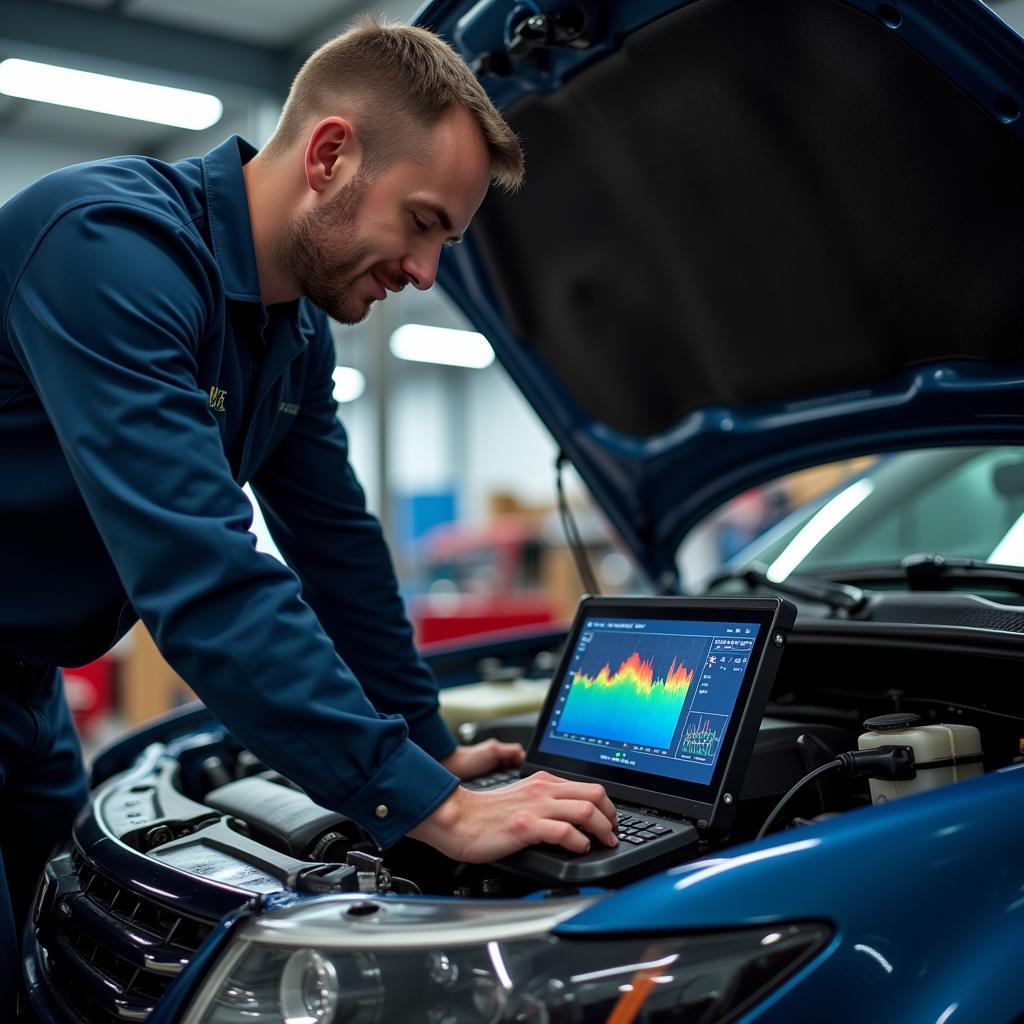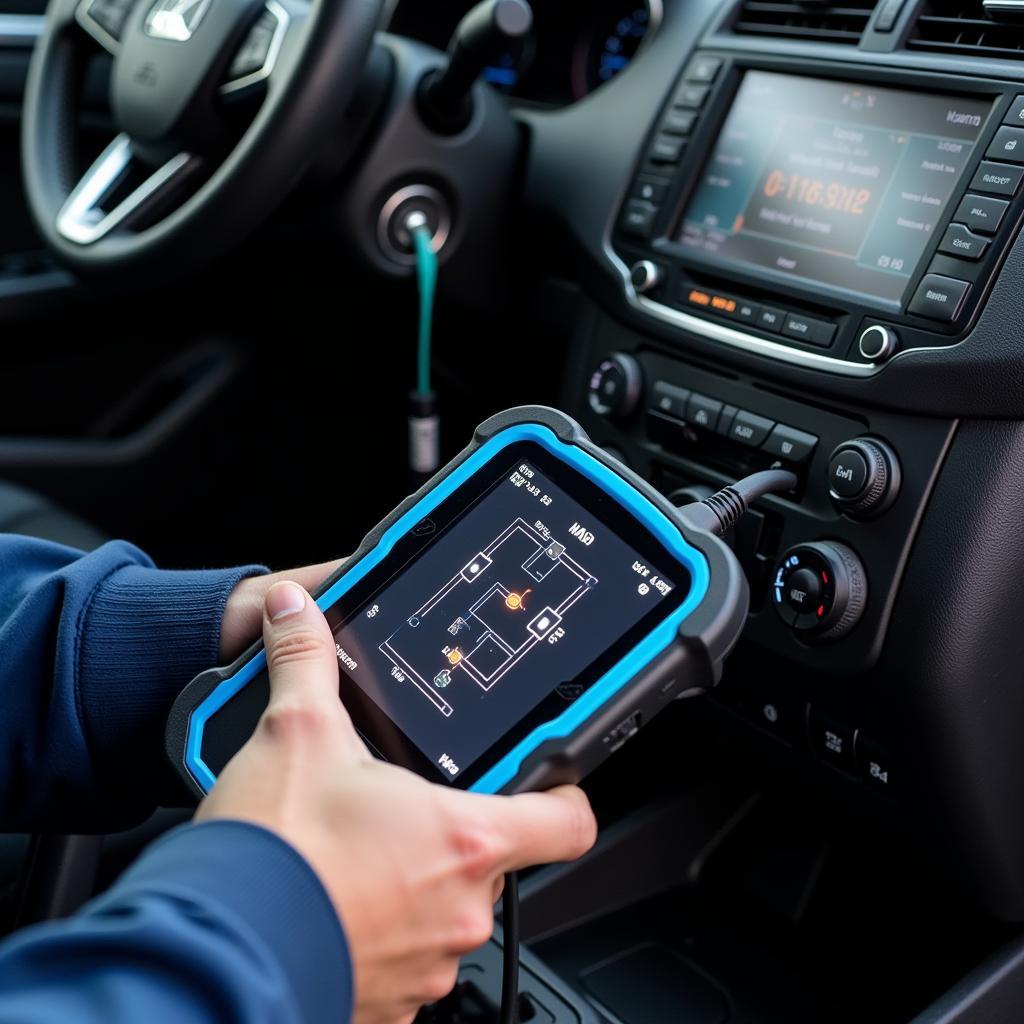For both car enthusiasts and professional mechanics, a good car diagnostic tool is essential. With so many options flooding the market, choosing the best one for your needs can feel overwhelming. This comprehensive guide dives deep into the world of car diagnostic tools, analyzing their features, benefits, and drawbacks to help you make an informed decision.
Why You Need a Car Diagnostic Tool
A car diagnostic tool is like a window into your vehicle’s computer system. It allows you to:
- Diagnose Engine Problems: Identify those pesky “Check Engine” lights and understand their root causes.
- Read and Clear Fault Codes: Decode those cryptic error codes and potentially save a trip to the mechanic.
- Monitor Live Data: Observe real-time data from various sensors, like engine temperature and fuel pressure, giving you insights into your car’s performance.
- Customize Car Settings: Depending on the tool and your vehicle, you might be able to adjust certain parameters like automatic door locking.
- Save Money in the Long Run: By catching problems early, you can potentially avoid costly repairs down the line.
 Mechanic using a car diagnostic tool
Mechanic using a car diagnostic tool
Types of Car Diagnostic Tools
The market offers a range of car diagnostic tools catering to different needs and budgets:
1. Basic Code Readers:
As the name suggests, these are entry-level tools that can read and clear basic diagnostic trouble codes (DTCs). They are generally affordable and sufficient for car owners who want to understand the reason behind a “Check Engine” light.
2. OBD2 Scanners:
These tools offer more advanced functionality than basic code readers. They can access more data from your car’s computer, including live sensor data, and provide information like emissions readiness status.
3. Professional-Grade Scan Tools:
Used by professional mechanics, these tools are the most comprehensive and expensive option. They offer extensive diagnostic capabilities, including bi-directional control (allowing you to command certain vehicle components), access to manufacturer-specific codes, and advanced programming functions.
 Professional-grade scan tool in use
Professional-grade scan tool in use
Factors to Consider When Buying a Car Diagnostic Tool
Choosing the best car diagnostic tool requires careful consideration of several factors:
1. Your Budget:
Prices range from affordable basic code readers to expensive professional-grade tools. Determine how much you’re willing to spend.
2. Your Skill Level:
If you’re a beginner, a user-friendly tool with a simple interface and clear instructions is crucial. For experienced users, advanced features and customization options might be more appealing.
3. Vehicle Compatibility:
Ensure the tool you choose is compatible with your car’s make, model, and year.
4. Features:
Consider the specific features that are important to you, such as:
- Live data streaming:
- Bi-directional control:
- Special functions:
- Software updates:
5. User Interface and Ease of Use:
A user-friendly interface with clear menus and intuitive navigation is crucial for a smooth experience.
Top Car Diagnostic Tool Recommendations
For DIYers and Car Enthusiasts
Tips for Using a Car Diagnostic Tool
- Read the manual: Before using any tool, thoroughly familiarize yourself with its functions and safety precautions.
- Connect properly: Ensure a secure connection between the tool and your car’s diagnostic port (usually located under the dashboard).
- Start with the basics: Begin by reading and clearing any fault codes.
- Interpret data carefully: Don’t jump to conclusions based on a single code or data point. Use your knowledge and research to interpret the information accurately.
- Seek professional help when needed: If you encounter complex issues or are unsure about a diagnosis, don’t hesitate to consult a qualified mechanic.
 Mechanic using a diagnostic tool under a car
Mechanic using a diagnostic tool under a car
Conclusion
Investing in the best car diagnostic tool can empower you to understand your vehicle better, save money on repairs, and even enhance your car’s performance. By carefully considering your needs, budget, and the factors discussed above, you can find the perfect tool to keep your car running smoothly for years to come.
Need help understanding car diagnostics? Check out our other helpful resources:
FAQs
Q: Can I use any car diagnostic tool on any car?
A: No, compatibility is crucial. Make sure the tool you choose supports your car’s make, model, and year.
Q: Will a car diagnostic tool fix my car?
A: No, it’s a diagnostic tool, not a repair tool. It helps you identify problems but doesn’t fix them.
Q: Do I need a professional-grade tool as a car enthusiast?
A: Not necessarily. If you’re comfortable with more advanced features and want the most comprehensive diagnostics, then yes. However, for most DIYers, a good OBD2 scanner or even a basic code reader can suffice.
Q: How often should I use a car diagnostic tool?
A: It’s a good idea to scan for codes periodically, even if your car seems to be running fine. Early detection is key to preventing bigger problems.
Q: Can a car diagnostic tool void my car’s warranty?
A: No, using a diagnostic tool itself won’t void your warranty. However, attempting repairs beyond your skill level based solely on a code reading could potentially lead to issues.
If you have any more questions or need assistance choosing the right car diagnostic tool, don’t hesitate to contact us via WhatsApp: +1(641)206-8880, Email: [email protected]. Our dedicated team is available 24/7 to support you in finding the perfect solution for your automotive needs.

Leave a Reply